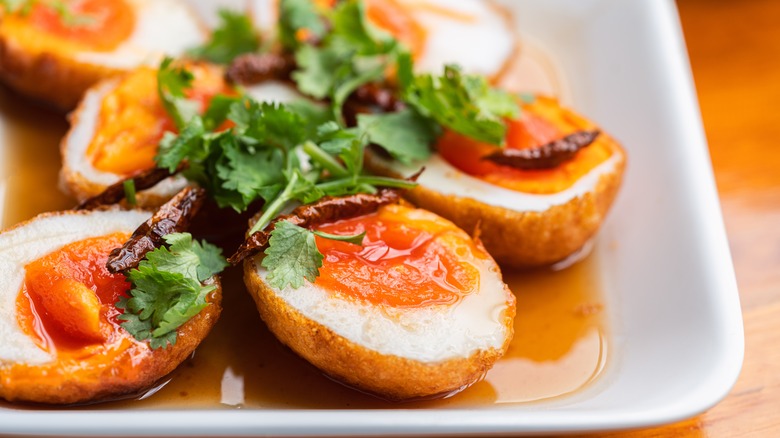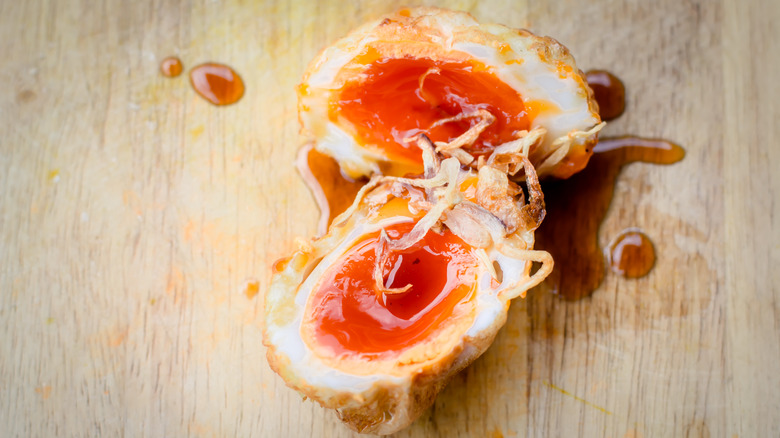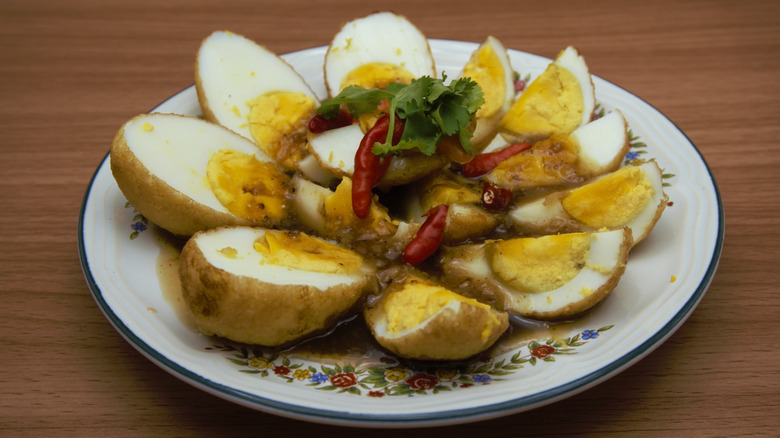The Mystery Behind The Naming Of Thai 'Son-In-Law' Eggs
Is there any food that can't be improved by deep-frying it? A long, greasy history of human innovation suggests not. It seems that people have deep-fried just about every edible substance on the face of the earth, including some truly crazy foods like watermelon and bubble gum. Some daring folks have even fried butter because if you're in for a penny, you might as well go in for a pound (or many pounds, depending on how much you eat).
If we're willing to deep-fry gum, it shouldn't surprise anyone to learn that a food as common as eggs would be a hot candidate for the fryer in many cultures. The Scotch eggs of Britain, wrapped in sausage for an extra shot of fat, are a well-known example. Less well known is the Thai specialty, kai look keuy — hard-boiled eggs finished off in hot oil and topped with a sweet and sour sauce. According to Atlas Obscura, the name of this dish translates to English as 'son-in-law eggs,' and there is a rather gruesome story behind this moniker.
Legend says the eggs were a thinly-veiled threat
The origin of the name 'son-in-law eggs' is not entirely clear, but Atlas Obscura says the most popular explanation comes from a legend concerning a vengeful mother-in-law. As the story goes, a protective mother learned that her daughter's husband was mistreating her and decided to send a threatening message to the man. According to the legend, she invited her son-in-law over and served him a pair of fried eggs. The not-so-veiled threat was meant to imply that a certain other pair of anatomical orbs would land in the deep fryer next if the man didn't change his ways.
The story isn't verified and closer to legend at this point, but there are some competing explanations that don't bear any ... unpleasant implications. Bangkok-based blogger Xinyi Liang tells another story where a petty father sought to embarrass his son-in-law by having them compete to see who could make a better omelet for his daughter. The father went first, then, in an effort to sabotage his son-in-law, boiled the remaining eggs. When the son-in-law realized he couldn't make an omelet, he improvised by frying the eggs and whipping up a sauce from the ingredients he had on hand. The daughter swooned over her suitor's quick thinking and he won the competition.
In reality, son-in-law eggs are an innocent snack
All of these origin stories play on feelings of contempt between in-laws, but this stands in sharp contrast to the way kai look keuy are actually served in Thailand. The Specialty Broadcasting Service reports that son-in-law eggs are a staple of the Thai street food scene and something that people eat with great joy — not with the fear of oleic castration. Atlas Obscura explains that mothers often make kai look keuy as a snack for their children. Kids are the biggest fans of the dish, largely owing to the caramelly sauce they are often served with.
Depending on which origin story you believe, the sauce may have been invented by a resourceful son-in-law trying to create something special from his pantry items. It is sweet, salty, and tangy all at once and made from palm sugar, oil, shallots, fish sauce, coriander, and tamarind. Tamarind is common in Thai cuisine, and Americans would recognize the flavor in pad thai. The combination of sugar and fat explains why son-in-law eggs are so popular with kids, but we doubt the mother is telling them the story behind this favored treat.


